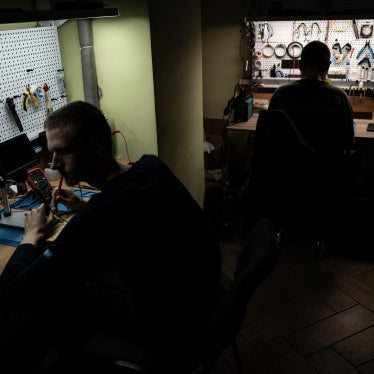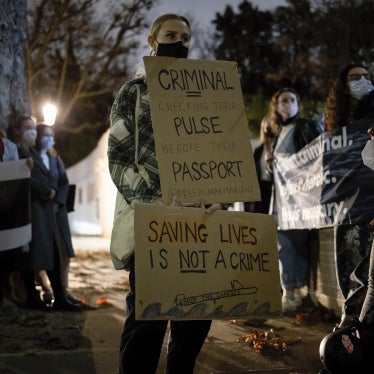An impending appeals court ruling in Tunisia threatens to undermine the Arab world's oldest independent human rights organization, according to a report released today by Human Rights Watch and the Observatory for the Protection of Human Rights Defenders. The Observatory is a joint program of the International Federation for Human Rights and the World Organization against Torture.
The 28-page report, "A Lawsuit against the Human Rights League, An Assault on All Rights Activists," also accuses the government of Tunisia of waging an all-out campaign against human rights critics, including heavy-handed police actions to block meetings of human rights organizations, physical assaults on men and women activists, passport confiscations, and interruptions in phone service.
Human Rights Watch and the Observatory urged the governments of France, and of all the European Union, to monitor the appeals court case against the league that opens April 30, and to pressure the Tunisian government to stop its harassment of human rights monitors.
"The Tunisian government's methods are heavy-handed and completely unsubtle," said Hanny Megally, executive director of the Middle East and North Africa division of Human Rights Watch. "The outside world has to make it clear that this kind of repression is unacceptable."
The twenty-four year old LTDH elected an outspoken new steering committee last October. The new leaders were promptly assailed by authorities of the ruling party and then hit with a lawsuit. Although the suit is a private action filed by four LTDH members, it has given the authorities a handy weapon to use against the League's new leadership. Police displayed unusual zeal and alacrity in executing a court injunction against the steering committee, evicting it from the League's headquarters and then routinely preventing League members from gathering. The courts also replaced the steering committee with a temporary administrator and then proceeded to void the League's last elections. It is the challenge to the latter ruling that opens April 30 before the Tunis Court of Appeals.
The election of a more assertive leadership within the Human Rights League reflects a growing defiance among members of civil society toward government repression. This trend is apparent not only in the LTDH but also in the National Council on Liberties in Tunisia (CNLT), a two-year-old human rights group that has continued to speak out even though authorities have denied it legal recognition. In one of the state's more egregious responses to this renewed activism, CNLT co-founder and human rights lawyer Nejib Hosni was re-imprisoned in January on trumped-up charges.
France has recently increased its public criticism of Tunisian rights abuses and its diplomatic presence at political trials. Human Rights Watch and the Observatory urged France to continue the diplomatic pressure, and to use its leadership within the European Union on North African affairs to press for human rights progress.
"Tunisian officials boast of the Human Rights League as 'a national institution,'" said Driss el-Yazami, Secretary-General of the International Federation for Human Rights. "While they may cherish the existence of the League for public relations reasons, they do much to impede it when it does its job by sounding the alarm on torture, political trials, and other all-too-common abuses."







